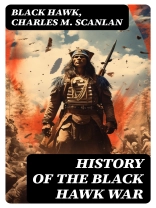In the compelling anthology, ‘History of the Black Hawk War, ‘ the editors present a vivid exploration of the complex cultural and historical event known as the Black Hawk War of 1832. Through diverse literary styles ranging from historical narrative to personal testimony, this collection paints a multifaceted portrayal of the war’s impact. The anthology deftly combines stirring harangues and poignant reflections, capturing the turbulent interactions between Native American tribes and settlers. Each piece contributes to an overarching theme of cultural conflict and resilience, with standout essays illustrating the depth of suffering and courage experienced during this period. The collection draws from the unique insights of authors Black Hawk and Charles M. Scanlan, who offer contrasting yet complementary perspectives. Black Hawk’s intimate accounts provide an indigenous viewpoint, enriching the anthology with a personal narrative of struggle and assertion of rights. In juxtaposition, Scanlan offers a broader historiographical perspective, framing the events within the wider movement of American expansionism. Together, their narratives intersect at a crucial historical and cultural juncture, presenting a nuanced dialogue that reflects both indigenous and settler experiences during a significant era of transformation. This anthology is an indispensable resource for readers eager to unravel the intricacies of the Black Hawk War from multiple viewpoints. By examining the fascinating synergy between Black Hawk’s personal reflections and Scanlan’s rigorous historical analysis, readers gain profound insights into the delicate balance of narrative that defines this pivotal historical moment. The editors have curated a collection that not only informs but also encourages reflection on the far-reaching consequences of these events. This volume promises to engage educators, historians, and general readers alike with its rich tapestry of voices and its enduring educational value.
Circa l’autore
Black Hawk, born Ma-ka-tai-me-she-kia-kiak in 1767, was a leader and warrior of the Sauk Native American tribe in what is now the Midwest of the United States. Historically recognized for his fierce resistance during the eponymous Black Hawk War of 1832, he remains an emblematic figure of indigenous struggle against European-American expansion. After his capture following the conflict, Black Hawk dictated an autobiography that has been published as ‘History of the Black Hawk War’. This account provides an invaluable Native American perspective on the war and insights into Sauk culture and society. Written with the help of his captor and interpreter, Antoine Le Clair, and newspaper editor J.B. Patterson, the book was one of the first autobiographies by a Native American leader. Black Hawk’s narrative is not just a personal memoir but an impassioned plea for understanding between diverse cultures and a critical document of American history. His literary style, though translated, conveys the oral tradition of his people and is imbued with the raw emotion of someone who lived through the tumultuous period of American expansion. Despite his fierce reputation, his works present him as a reflective and principled leader, keenly aware of the injustices done to his people and earnestly advocating for their rights.












